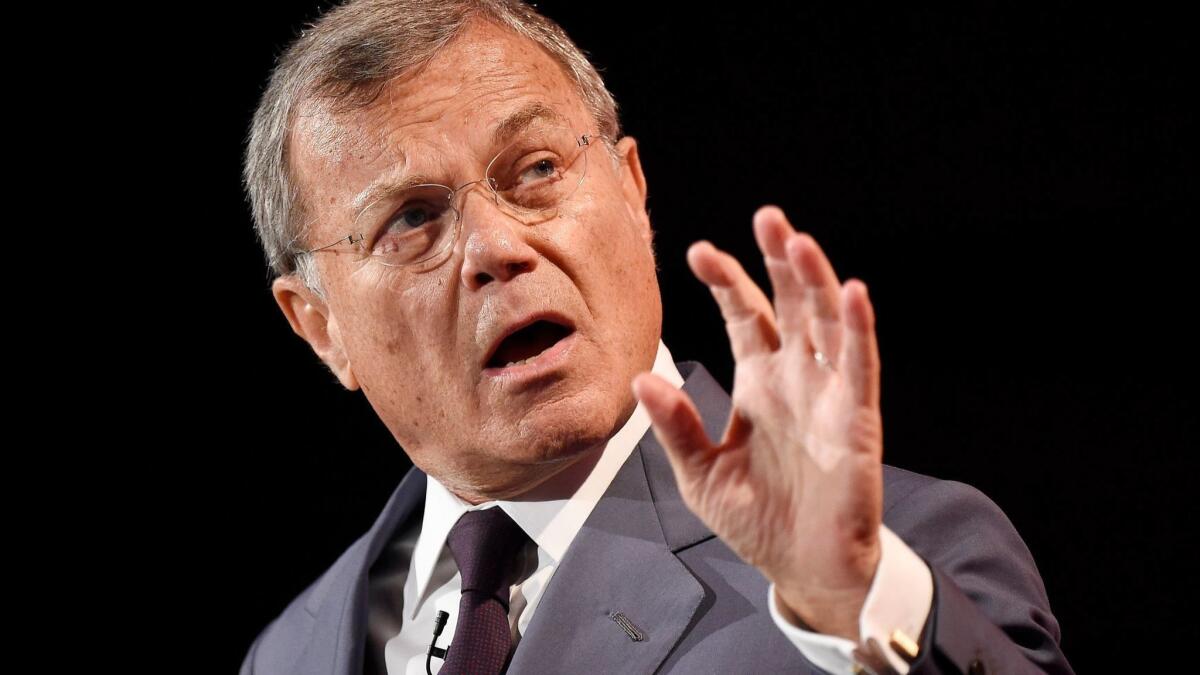Departure of advertising giant Sorrell leaves WPP empire vulnerable to breakup

Martin Sorrell’s abrupt exit from WPP leaves the advertising empire in search of a new chief executive for the first time and vulnerable to a break-up, as the sprawling network of agencies faces its biggest challenges since the global financial crisis.
Sorrell’s departure late Saturday from the world’s largest ad company puts WPP’s omissions in grooming a successor to its 73-year-old founder into sharp focus, even with shareholders long flagging the issue. It also raises the prospect of a split, as London-based WPP loses the man holding the empire together.
Sorrell quit WPP less than two weeks after the leak of an investigation by the company into allegations of personal misconduct and misuse of company assets, and just days before the board was set to publish the findings. He has denied the allegations, and WPP said Saturday that the investigation was complete, without revealing details.
The company’s shares fell 6.5% on Monday with WPP’s future strategy now unclear. Sorrell, who turned a 1985 investment in a wire shopping basket manufacturer — the name stands for Wire and Plastic Products — into a behemoth of more than 200,000 employees, was long seen as irreplaceable, the man pulling the strings to connect its more than 400 agencies who create marketing campaigns for clients such as Coca-Cola Co. and Procter & Gamble Co. Now, the group faces pitches from investment bankers pushing asset sales or a more dramatic dissolution.
“The cataclysmic thing has happened,” Alex DeGroote, a media analyst at Cenkos Securities, said by phone. “People are scared there’s another profit warning coming. They are in a negative tailspin.”
WPP’s data management unit Kantar, whose revenue growth has “consistently underperformed” the group average, is the most obvious candidate for disposal and could raise 3.5 billion pounds ($5 billion) to reduce debt or return cash to shareholders, Liberum analyst Ian Whittaker wrote in a note Monday.
“The chances of significant chunks of the business being sold off have dramatically increased,” Whittaker said. “Sir Martin could arguably be called the glue that bound much of WPP together.”
Companies such as Accenture, a debt-free consulting firm five times WPP’s market value at about $100 billion, have been seen as potential suitors for WPP units, and have recently been buying up ad agencies.
WPP’s board is now focused on finding a long-term solution to replace a stop-gap plan of having two interim operating chiefs and an executive chairman.
The next CEO will be faced with reviewing WPP’s strategy as it battles declining ad spending, competition for digital work from consultants and the threat of web giants cutting out agency middle men.
“Any executive filling Sorrell’s shoes needs to orchestrate assets across the holding company and doing so is a challenge in a fragmented federation of businesses such as those which exist within WPP,” Brian Wieser, a media analyst at Pivotal Research, said in an emailed note.
The WPP chief was an elder statesman of the ad industry, earning him a knighthood from Queen Elizabeth II. He was among Britain’s longest-serving CEOs in recent memory, appearing regularly in public to discuss issues such as Brexit, Donald Trump’s trade wars and the rise of Facebook Inc. and Google. He courted controversy with his pugnacious manner and inflated pay package, particularly at a time when WPP’s revenue stalled.
In a statement to WPP employees, Sorrell said the current disruption was putting “too much unnecessary pressure on the business” and that in the interest of the company and clients it was “best for me to step aside.”
The company’s decision not to reveal the specific nature of the allegations nor the outcome of the investigation is bad for WPP shareholders, said Guy Jubb, an honorary professor at the University of Edinburgh business school and a frequent critic of WPP’s corporate governance.
“WPP leaves a cloud of suspicion when the sunlight of transparency would be a welcome disinfectant,” Jubb said.
For years, the board supported Sorrell’s outsize pay packages amid shareholder complaints because he delivered. He earned about 200 million pounds ($287 million) over the last five years, largely from a performance-related bonus package.
But there have been signs Sorrell was losing his magic touch. WPP’s financial guidance has repeatedly proved too optimistic, and its shares have lost a third of their value over the last year — far more than rivals facing the same market challenges. WPP on March 1 lowered its long-term profit outlook, capping a string of disappointments that put Sorrell on the defensive.
Chairman Roberto Quarta has become executive chairman until the appointment of a new CEO. Mark Read, who heads WPP agency Wunderman, and Andrew Scott, WPP’s corporate development director, have become joint chief operating officers.
Mayes writes for Bloomberg.






